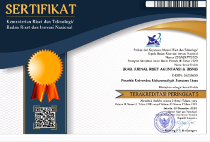Pelayanan Perpajakan, Dan Sosialisasi Perpajakan, Terhadap Kepatuhan Wajib Pajak
Abstract
Keywords
Full Text:
PDFReferences
Alabede, J., Affrin, Z., & Idris, K. (2011). Tax service quality and compliance behaviour in Nigeria: Do taxpayers financial condition and risk preference play any moderating role? European Journal of Economics, Finance and Administrative Science, 90108.
Ananda. (2015). Faktor-faktor yang mempengaruhi kepatuhan wajib pajak dalam membayar pajak bumi dan bangunan dengan pendapatan masyarakat sebagai variabel moderating (Studi pada wajib pajak di Kota Medan). Thesis Universitas Sumatera Utara.
Bobek, D., & Ratdke, R. (2007). An Experiential Investigation of Tax Professionals Ethical Environments. Journal of the American Taxation Association, 29(2), 6384.
Fidel. (2010). Cara Mudah &Praktis Memahami Masalah-Masalah Perpajakan. PT Raja Grafindo Persada.
Ghozali. (2011). Aplikasi Analisis Multivariate Dengan Program IBM SPSS 19 (5th ed.). Badan Penerbit Universitas Diponegoro.
Imelda, B., & H. (2014). Analisis Faktor-Faktor Yang Mempengaruhi Kepatuhan Wajib Pajak Orang Pribadi (Study pada Kantor Pelayanan Pajak Pratama Semarang). Tax & Accounting Review, 1(1).
Jatmiko, A. (n.d.). Pengaruh Sikap Wajib Pajak Pada Pelaksanaan Sanksi Denda, Pelayanan Fiskus, Dan Kesadaran Perpajakan Terhadap Kepatuhan Wajib Pajak Orang Pribadi di Kota Semarang. Tesis Program Pasca Sarjana Magister Sains Ilmu Akuntansi Universitas Diponegoro.
Lianty, H., Hapsari, D. W., dan K. (2017). Pengetahuan Perpajakan, Sosialisasi Perpajakan, Dan Pelayanan Fiskus Terhadap Kepatuhan Wajib Pajak OP (Non Karyawan) di KPP Pratama Bandung Bojonagara. Jurnal Riset Akuntansi Kontemporer (JRAK), 9(2), 5565.
Scholz , J., & Lubell, M. (1998). Adaptive Political Attitudes: Duty, Trust, and Fear as Monitors of Tax Policy. American Journal of Political Science, 42(3), 903920.
Sugiyono. (2012). Statistika Untuk Penelitian. Alfabeta.
DOI: https://doi.org/10.30596/jrab.v21i1.6531




